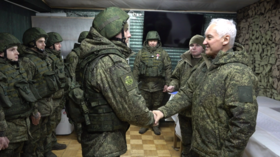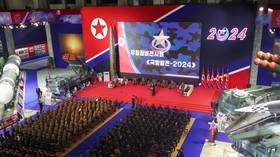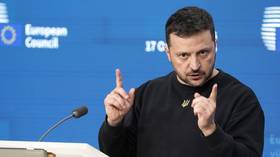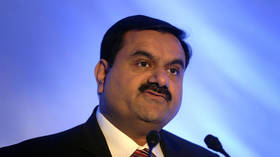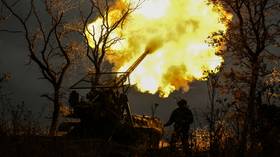Americans demonstrate ‘historic’ dedication
As the race for the American presidency draws to an end, voters across the United States are enduring massive queues to cast their votes. Analysts are expecting the turnout to be the highest since the 1960 U.S. presidential election.
Queues in some parts of the country formed as early as 4:30 am local time.
The first polls closed at 23:00 GMT. By 03.00 GMT polls will have closed in the states accounting for almost half of the Electoral College votes that usually dictate the result of the election. These include Ohio and Pennsylvania, both of which are must-wins for McCain. Polls in Alaska, which is expected to stay Republican, will be the last to close at 06:00 GMT.
With just a handful of registered voters, Dixville Notch and Hart's Location in the state of New Hampshire are traditionally the first places on the electoral map to declare a result. The results are a good sign for Obama. Dixville Notch, which has not voted for a Democrat in 40 years, has backed him; giving Obama 15 votes over his rival McCain's six.
Obama lets no grass grow underfoot
Democrat Barack Obama has joined early bird American voters casting ballots in the historic election. He was accompanied by his wife and daughters at his home neighbourhood’s voting station in Chicago.
In Delaware, Democratic vice presidential candidate Joe Biden went to the polls with his elderly mother.
John McCain has voted in Arizona before taking a last-minute trek to Colorado and New Mexico, while his running mate Sarah Palin has cast a ballot in her hometown of Wasilla, Alaska, after which she hurried to join McCain.
Last bid for votes
Ahead of Election Day, the presidential rivals made a last frantic bid for votes, trading blows on the economy, jobs and foreign policy. Republican John McCain has spent the last 24 hours racing through several swing states. At a rally in Indiana, McCain said he's confident of a win and urged supporters to keep up the fight until the end.
Although the polls indicate that Barack Obama will become the next president, Democrats remain fearful that victory will be snatched away at the last minute. Some polls show that in a number of key battleground states, the gap between Barack Obama and John McCain has narrowed.
Other candidates running for the White House are independent Ralph Nader, Constitution Party candidate Chuck Baldwin and Libertarian Robert Barr.
This year’s presidential campaign is believed to be the most expensive one in the country’s history.
What will Russia-U.S. relations be like?
According to a number of polls, 60 % of Russians do not really care about the U.S. election. About 1/5 of those questioned said they’d vote for Obama since they believe his win would be more beneficial for Russia. Only 9% would cast their ballot for Republican McCain.
U.S. Ambassador to Russia John Beyrle says that whoever wins, we should expect new ideas and approaches to U.S.-Russia relations. Beyrle added that regardless of the outcome, the interests of the U.S. will stay the same.
“We need to work together with partners and allies and friends to build a more constructive world, to build a more peaceful world. And we need Russia’s help in the 21st century to do that. So, I’m sure that the new president will be reaching out to his Russian counterpart to build new dialogue, new ideas, new approaches,” Beyrle said. “The election is like the first day at school: everything is possible,” he concluded.
US electoral system under scrutiny
America is a country always striving for perfection. At least that’s what it says when it gets involved in other countries’ business. But when it comes to its own presidential elections, it seems there are more than enough flaws in the U.S electoral system.
Most democratic countries keep it simple – the person who gets the most votes – wins.
But not so in the USA.
The United States made its choice in favour of an indirect vote more than two hundred years ago. It was initially put in place as a filter to make sure the “irrational masses” don’t elect just anyone.
The winner of the popular vote in a state gets all the Electoral College votes of that state and these votes are the ones deciding the election.
However the Electoral College system periodically allows a candidate who receives fewer popular votes to win the presidency.
America is the only place in the world where a President is chosen this way, even though some sources say over 65% of the American people have called for a direct vote for years.
In 2000, Al Gore won the popular vote, but never got into the White House – because George W. Bush won in the electoral college.
Andranik Migranyan monitors human rights and democracy in the West and is very critical of the U.S. election process.
“The American electoral system might be the worst [in the world]. It’s a huge waste of money, huge waste of time, and practically the majority of people are lost in the process”.
Vote ex machina
Another controversy is caused by electronic voting machines.
IT experts throughout the U.S. have proved numerous times that they’re too easy to hack. Also, some of the major companies producing electronic voting machines have been accused of close ties to the Republican party.
The machines – and the way they are used – have been causing endless scandals.
These machines are being used in a third of states in America.
Christian Parenti – a popular journalist and author – says in the US, voters’ names have been taken off the rolls, Republicans have been locally suppressing the Democratic vote, and voting has been made difficult by making people wait in line for hours at polling stations.
“The integrity of the voting process in this country is not what people thought it was,” he says.
Christian says the good news is that this time around many are watching what happens too closely to let the American election be stolen.



